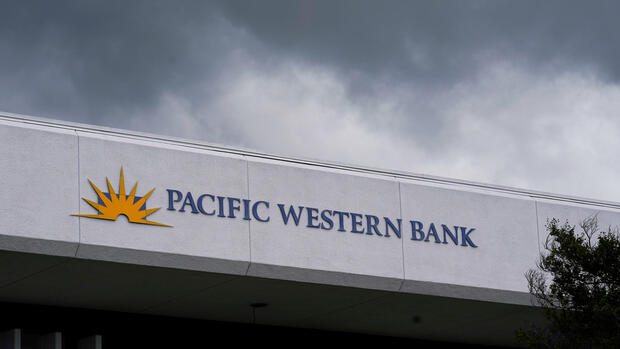PacWest stock has come into the focus of investors this week.
(Photo: AP)
new York America’s regional banks ended a turbulent week with a relief rally. Los Angeles-based PacWest’s stock shot up 82 percent on Friday. The Western Alliance from Phoenix gained 49 percent. The KBW index of the regional banks rose by almost five percent.
The rally was also driven by JP Morgan Chase. Analysts at America’s largest bank upgraded three regional banks on Friday despite the turbulence of the past few weeks. The significant price losses of the past few days are mainly due to so-called short sellers who rely on falling share prices. The situation is significantly less serious than the short breaks suggested.
“The regional banks’ quarterly figures have shown that deposit outflows were not as large as feared,” said JP Morgan analyst Steven Alexopoulos. In addition to the Western Alliance, he also upgraded the Institutes Zions and Comeria.
JP Morgan only took over large parts of the previously bankrupt First Republic Bank on Monday. This should actually bring peace to the banking industry for the time being. This was the third bank failure in two months, following Silicon Valley Bank (SVB) and New York’s Signature Bank in March. However, it was also the last bank that had come under acute pressure. But things turned out differently. Shares fell again on Tuesday.
>> Also interesting: US banks often do worse than European banks when it comes to quality of management
“Short sellers saw themselves in a position of strength after the First Republic went bust,” believes Alexopoulos. This has also alarmed the administration of US President Joe Biden and regulators. The White House is “monitoring short selling pressure on healthy banks,” Biden’s spokeswoman said Thursday. The American Bankers Association had called for a temporary ban on short selling and also raised allegations of market manipulation.
“There are no easy solutions to the crisis of confidence”
Meanwhile, discussions continue about ways to end the crisis of confidence in the regional banks. “But the problem is that there are no easy solutions,” warned Julian Wellesley, an analyst at Boston-based wealth manager Loomis Sayles & Co. Short sellers borrow shares and sell them on. When prices fall, they buy them back and keep the difference. They made billions in profits.
But a temporary ban “won’t do much to restore confidence in the long term,” argues Wellesley. During the 2008 financial crisis, short selling was suspended for two weeks. However, a study by the regional central bank in New York subsequently showed that this did not have the desired success. Persistent pressure on share prices can be dangerous, according to Wellesley. Even if the bank itself isn’t in trouble, “there’s a risk that a massive fall in prices could become a self-fulfilling prophecy.”
>> Read also: This small US bank doesn’t want to be confused with the ailing Pacwest
There are also discussions about increasing deposit insurance in the USA. Assets of up to $250,000 per customer per bank are currently insured. Weeks ago, regional banks had called for deposits to be fully guaranteed for the next two years. That was also the case during the financial crisis. However, this requires approval from the deeply divided Congress, which is considered unlikely.
The idea of only granting a higher deposit guarantee to business accounts of companies is also being discussed. But Congress has to agree to that as well. Loomis analyst Wellesley therefore believes that Friday’s rally will not be sustained.
The problems were triggered by the consequences of the US Federal Reserve’s strict interest rate policy. As a result, many institutes suffered book losses on their bonds and loans. These lose value when interest rates rise. A number of banks did not see the rising interest rates coming and therefore underestimated the interest rate risks. The Fed hiked interest rates again on Wednesday, to a range of 5.0 to 5.25 percent.
PacWest is in talks with potential partners and investors and will review all options to “maximize shareholder value,” it said. But finding a buyer is difficult. “The last three bank failures have shown that it is worthwhile for interested parties to let the bank go bankrupt and later take over the fillet pieces at a lower price,” said a bank investor to the Handelsblatt. “That makes the prospects for shareholders even bleaker.”
More: After the collapse of First Republic: short sellers see high risks at other US banks
